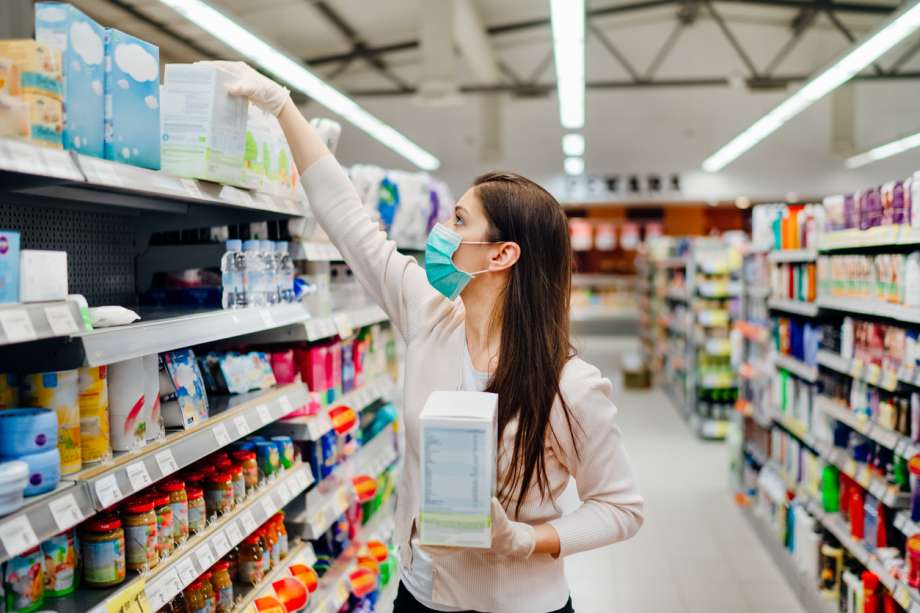The Latest on the Baby Formula Shortage

Most of us have long been reading about the infant formula shortage in the news. You may have seen empty spaces on retailers’ shelves. And if you’re a formula feeding parent living in America, the baby formula shortage has probably affected you personally.
What’s behind the national shortage of infant formula products? What is the Biden administration doing about it?
And, most importantly, if you’re suddenly unable to buy your usual formula, what can you do?
We’ve compiled all of the biggest news and information surrounding the baby formula shortage for you. Here is everything you need to know!
This article is reviewed and updated on a regular basis to provide the most accurate information. Latest update: August 15th, 2022.
Why is There a Baby Formula Shortage?
There are several reasons.
1. Supply Chain Issues
The COVID-19 pandemic has created supply chain issues around the world, and not just in the formula market. The pandemic has sidelined workers, which has, in turn, created worker shortages in production, distribution, and in stores.
2. Sunflower Oil Shortage
The war in Ukraine has created a shortage of sunflower oil, which is used by many baby formula manufacturers.
3. Manufacturer Problems
Problems with the Abbott Nutrition factory in Sturgis, Michigan, eliminated a major source of formula products in the United States for several months.
In February 2022, following the hospitalization of four infants and the death of one, Abbott Nutrition recalled batches of Similac, Alimentum, and EleCare powder baby formulas. The formulas were infected with the Cronobacter sakazakii and Salmonella Newport bacteria.
The FDA (Food and Drug Administration) ordered Abbott to shutter the Sturgis factory, which was one of the country’s major baby formula suppliers. Even after Abbott Nutrition solved the problem and reopened, severe storms and flooding caused another shutdown between mid-June and mid-July 2022.
4. Panic Buying
Finally, consumer stockpiling has resulted in even emptier store shelves.
How Long Will It Last?
Stock rates for baby formula are improving, but the crisis isn’t over yet. To date, the out of stock rates for different baby formula products remain between 25 to 30 percent. Shortages are predicted to last at least into the fall.
What is the Government Doing to Help the Baby Formula Shortage?
First, on May 18, 2022, President Joe Biden invoked the 1950 Defense Production Act. This act instructed the government to prioritize formula production. It also compels companies along the supply chain to provide resources to formula manufacturers first, before providing them to other companies.
Also, on July 18, 2022, the White House and the Department of Health and Human Services (HHS) launched Operation Fly Formula. This mission seeks to ease the shortage by importing infant formula from abroad. The formula must meet US health and safety standards.
In addition, the FDA eased rules around the import of formula made by foreign manufacturers, with an eye toward making these changes permanent.
Finally, the WIC and SNAP programs have been granted the flexibility to provide additional formula types for WIC and SNAP recipients.
What Should I Do if I Run Out of Formula?

There are a number of things you can try:
1. Go to a Breast Milk Bank
Even if you aren’t breastfeeding, your baby may be able to drink breast milk.
Breast milk banks provide safe, pasteurized milk from donors who have been screened for health. Most milk banks are non-profit.
Check the Human Milk Banking Association to find a breast milk bank near you.
2. Check Out Baby Formula Exchanges
Parent-to-parent exchanges are popping up across the country. Exchanges pair up parents who need formula with people who want to donate it. The Free Formula Exchange is one national exchange.
3. Ask Your Pediatrician
Your pediatrician may have formula samples that can provide nutrition in a pinch.
Is There Help For Low Income Families?
In May of 2022, Abbott Nutrition announced that in places where Abbott had contracts with WIC, (the US Department of Agriculture’s special supplemental nutrition program for women, infants, and children), the company would cover the cost of switching brands through August 30 2022.
Also, some families who receive WIC benefits have successfully negotiated with their state WIC programs to obtain specialized formulas from abroad.
In addition, Abbott has extended some of its rebate programs to help customers.
Also check with your local TANF (Temporary Assistance for Needy Families) program to see if you qualify for formula assistance.
Can I Substitute Cow's Milk for Infant Formula?
Cow’s milk isn’t as easy to digest as human breast milk or formula. It also lacks certain essential nutrients. And if your baby has a cow’s milk allergy, you should never use this as a substitute.
However, according to Dr. Matthew Kadish, an assistant professor in the University of New Mexico’s Department of Pediatrics, you can substitute cow’s milk for formula for a short time if your baby is six months of age or older.
The substitution should last less than a week, as cow’s milk can interfere with a baby’s absorption of iron and lead to an iron deficiency.
Is It Safe to Water Down Formula to Make it Last?
No.
Too much water in infant formula can cause life threatening seizures, and even comas.
Can You Make Baby Formula at Home?
Don’t risk it.
You may have seen recipes for homemade baby formula on social media. But the American Academy of Pediatrics says don’t do it.
Breast milk contains everything your growing baby needs. FDA approved infant formula is strictly regulated for nutritional content and food safety. Homemade recipes generally can’t provide the essential nutrition that your baby needs.
What About Foreign Made Formulas?
The Biden Administration has arranged for the importation of safe infant formula from France, Mexico, Switzerland, Australia, and other countries to ease the formula shortage. These products are already showing up on store shelves.
At the same time, beware of purchasing foreign made formula from unofficial sources, as it may not meet FDA standards for nutrition and safety concerns.
Switching Your Baby Formula

For babies with special nutritional needs, switching formula brands or types may pose a problem.
What's the Best and Healthiest Way to Switch Formulas?
If it’s simply a matter of switching store brands, you may be able to switch to a different formula if yours is unavailable.
First, talk to your baby’s doctor. Your pediatrician can help you to choose a safe new formula that meets your baby’s specific needs.
If your usual formula was working for you, consider a new formula with the same protein type (ie; cow’s milk, soy, hydrolyzed, partially hydrolyzed, etc) as your usual one. This will make the transition easier on your baby’s tummy.
Check the nutritional content of the old formula against that of the new. Choose a new formula with the same additives (such as iron) and nutritional characteristics as the old one.
If you’re changing proteins, change formulas gradually, over the course of several days, if you can.
Can Switching to a Different Formula Have Side Effects?
Switching to a different formula may cause digestive upset. In some cases, a baby may be allergic to ingredients in the new formula.
Watch out for digestive problems and allergic reactions. These may include:
- Constipation
- Gas
- Vomiting
- Diarrhea
- Rash
If your baby has any of these symptoms during or after switching to a new formula, see your pediatrician or health care provider immediately.
What If My Baby Has Allergies or Other Issues?
If your baby is taking a specialty formula for allergies or other issues, check with your pediatrician to find a new specialized formula.
What Can I Do to Help Others?
Even if the baby formula shortage isn’t affecting you personally, there are a few things you can do to help those who are being affected.
1. Don't Judge
A lot of people on social media are asking, why not simply breast feed?
The answer is that, although breast milk is a baby’s natural food, breastfeeding isn’t possible for some parents. In fact, the CDC and the American Academy of Pediatrics recommend against breastfeeding if:
- Your baby has galactosemia
- You have HIV, T-cell lymphocytic virus, or certain other illnesses
- You’re taking certain medications
- You’re undergoing diagnostic imaging with radiopharmaceuticals.
Some mothers may also struggle with mastitis or find it difficult to breastfeed for a number of reasons.
A very basic way to help parents struggling with the baby formula crisis is to not compound their problems with shame or judgment.
2. Donate Breast Milk
If you’re in a position to donate breast milk, do it! Also consider donating time or money to your local milk bank.
3. Donate Formula
If you have unopened containers of formula, consider donating them to your local food bank, shelter, formula exchange, etc.
Your local child-based charities could also use your help! Consider donating your time or money to your local:
- Food bank
- Milk bank
- Formula Exchange
- Shelter
- Day Care Center
We're All in It Together
The infant formula shortage is causing problems for families now, but it won’t last forever.
In the meantime, if your family is affected, help is available. And if you can help, please consider doing so.

